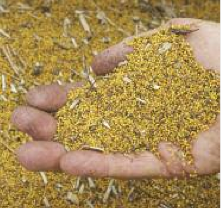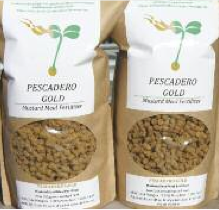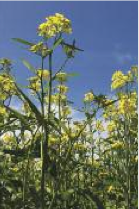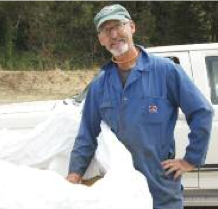A Watsonville company discovers
a supercharged soil amendment
—and fuel for the tractors, too
 It started as a conversation between local organic pioneers, Ken Kimes of New Natives in Corralitos and Larry Jacob of Del Cabo and Jacobs Farm. They dreamed of finding a way to use fallow fields along the coast north of Santa Cruz for growing biofuel to run their farm vehicles. But the farmers soon discovered that the green power of their raw material of choice—the humble mustard seed—went far beyond powering the equipment.
It started as a conversation between local organic pioneers, Ken Kimes of New Natives in Corralitos and Larry Jacob of Del Cabo and Jacobs Farm. They dreamed of finding a way to use fallow fields along the coast north of Santa Cruz for growing biofuel to run their farm vehicles. But the farmers soon discovered that the green power of their raw material of choice—the humble mustard seed—went far beyond powering the equipment.
With the help of an expert in alternative energy from Lawrence Berkeley National Laboratory and advice from the University of Idaho, they found out that mustard seed met their criteria of being a non-irrigated and seawater-tolerant crop. They already knew that a compound in mustard seed called glucosinolate—which makes it spicy hot—has the added bonus of being an effective organic fertilizer. So Watsonville-based Farm Fuel Inc. was born, with Jim Cochran of Swanton Berry Farm and biodiesel mechanic Henry Smith also on board.
Since biblical times, the tiny mustard seed has been a symbol of how something very small can grow and blossom into a flourishing enterprise. But the path hasn’t been easy for Farm Fuel since its inception in 2007.
 “The fuel market went up and down, and the person we were selling to stopped refining biodiesel locally,” explains biologist Stefanie Bourcier, who manages Farm Fuel Inc. on a day-to-day basis with five other employees. While partner Henry Smith has converted his pick-up truck to run on mustard oil, there aren’t any other fuel customers right now.
“The fuel market went up and down, and the person we were selling to stopped refining biodiesel locally,” explains biologist Stefanie Bourcier, who manages Farm Fuel Inc. on a day-to-day basis with five other employees. While partner Henry Smith has converted his pick-up truck to run on mustard oil, there aren’t any other fuel customers right now.
Eventually, the focus shifted from making fuel to producing mustard meal, which is the byproduct left over when the oil is pressed. It comes out of the press looking like big flakes of breakfast cereal and is then compacted into pellets of potent organic fertilizer.
Farm Fuel brought in a bumper crop of mustard seed on 45 acres in Pescadero last summer. It was a spectacular yellow field in spring, and then, to maximize its glucosinolate, Kimes and Smith allowed the towering seven-foot plants to toast to a crisp before cutting in August. Using a 1960s vintage Massey Ferguson combine, Farm Fuel harvested a ton and a half of mustard seed—enough to produce 3,000 gallons of biofuel and 60,000 pounds of soil amendment.
The fertilizer, marketed as Pescadero Gold and available for purchase from the company’s website, is a double-action product—it both kills off harmful soil diseases and encourages the growth of beneficial organisms.
“When you put it in the soil and add water, there is a reaction just like you get in your mouth when you bite into a spicy mustard seed,” says Bourcier. “Then, depending on the type of mustard seed, it will either give off gas or pass through the soil, killing pathogens like nematodes.” Mustard meal also contains nutrients that allow the beneficial predatory fungi trichoderma to flourish, helping keep the bad guys at bay throughout the growing season.
 Swanton Berry Farm and High Ground Organics in Watsonville are among the local growers that will be using mustard meal this spring on strawberry crops in place of the ozone-depleting fumigant, methyl bromide—which is not organic and is being phased out under terms of an international treaty. Mustard meal has also been used successfully on basil, carrots, raspberries, tomatoes, apples and grapes, and Swanton and High Ground have had good success with it.
Swanton Berry Farm and High Ground Organics in Watsonville are among the local growers that will be using mustard meal this spring on strawberry crops in place of the ozone-depleting fumigant, methyl bromide—which is not organic and is being phased out under terms of an international treaty. Mustard meal has also been used successfully on basil, carrots, raspberries, tomatoes, apples and grapes, and Swanton and High Ground have had good success with it.
“Mustard has been planted as a cover crop in vineyards and orchards for hundreds of years. We’re just taking that same chemistry and making it a little more efficient and easy to apply,” Bourcier says. In fact, Farm Fuel found in research trials that application of mustard seed meal boosted strawberry production by as much as 50%.
 Experience using mustard meal in strawberry fields has led Farm Fuel to an even more lucrative type of business that may finally allow it to post its first profit this year. It’s a service that prepares strawberry fields for planting using ASD or Anaerobic Soil Disinfestation—an organic process that uses only rice bran, mustard seed meal, molasses, black plastic and water. Last fall Farm Fuel treated 150 acres in the Pajaro Valley using ASD, up from just 6 acres in 2011, and business is booming.
Experience using mustard meal in strawberry fields has led Farm Fuel to an even more lucrative type of business that may finally allow it to post its first profit this year. It’s a service that prepares strawberry fields for planting using ASD or Anaerobic Soil Disinfestation—an organic process that uses only rice bran, mustard seed meal, molasses, black plastic and water. Last fall Farm Fuel treated 150 acres in the Pajaro Valley using ASD, up from just 6 acres in 2011, and business is booming.
“We’re seeing ASD work as well as the [methyl bromide] fumigant, and it’s easy and no more expensive than fumigation,” says Bourcier. “More and more doors are opening, and it’s amazing because our clients are farmers and they’re the best people.” So the company—founded on tiny mustard seeds—is blossoming at last in a dramatic, if unexpected, way.
Farm Fuel Inc.
831.763.3950
farmfuelinc.com
About the author
Deborah Luhrman is publisher and editor of Edible Monterey Bay. A lifelong journalist, she has reported from around the globe, but now prefers covering our flourishing local food scene and growing her own vegetables in the Santa Cruz Mountains.
- Deborah Luhrmanhttps://www.ediblemontereybay.com/author/dluhrman/
- Deborah Luhrmanhttps://www.ediblemontereybay.com/author/dluhrman/
- Deborah Luhrmanhttps://www.ediblemontereybay.com/author/dluhrman/
- Deborah Luhrmanhttps://www.ediblemontereybay.com/author/dluhrman/


